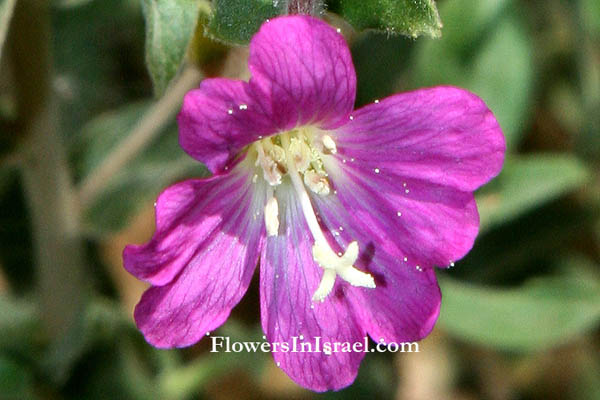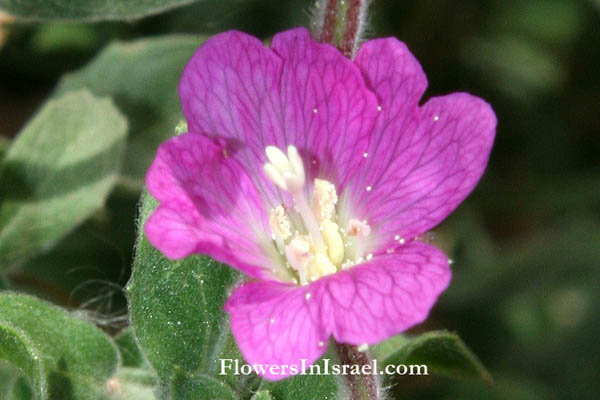Codlings and Cream, Apple Pie, Cherry Pie, Gooseberry Pie,
Sod Apple and Plum Pudding,
Hebrew: ערברבה שעירה, Arabic: سنفية مشعرة, Egypt: "'Alfa", "Sikh"
| Scientific name: | Epilobium hirsutum L. | |
| Common name: | Great Willow-herb, Son-before-the-Father, Codlings and Cream, Apple Pie, Cherry Pie, Gooseberry Pie, Sod Apple and Plum Pudding | |
| Hebrew name: | ערברבה שעירה | |
| Arabic name: | سنفية مشعرة | |
| Egypt: | "'Alfa", "Sikh" | |
| Nederlandse naam: | Harig wilgeroosje | |
| Family: | Onagraceae, נר-הלילה |

|
| Life form: | Hemicryptophyte | |
| Stems: | Up to 50 cm tall; erect and branched; densely hairy | |
| Leaves: | Opposite, lance-shaped with toothed edges, and attach directly on the stem (lack petiole), dentate or serrate margin; densely hairy | |
| Flowers: | 4 pink notched petals with white centers | |
| Fruits / pods: | Capsule, loculicidal; long, narrow seed pods that split open to release numerous seeds with long white hairs | |
| Flowering Period: | May, June, July, August, September, October, November, December | |
| Habitat: | Humid habitats | |
| Distribution: | Mediterranean Woodlands and Shrublands, Semi-steppe shrublands, Deserts and extreme deserts | |
| Chorotype, טיפוס התפוצה: | Euro-Siberian - Med - Irano-Turanian | |
| Summer shedding: | Perennating |

Derivation of the botanical name: Epilobium, epi, upon; lobos, a pod, The petals of these herbs surmount the podlike ovary. hirsutum, hairy.
The old English country name of 'Son-before-the-Father' arises because, as Henry Lyte (1529? – 1607), an English botanist and antiquary says in 1578: 'the long huskes in which the seede is contained doe come forth and waxe great before that the flouere openeth.' |